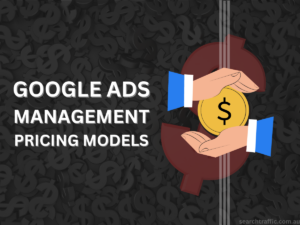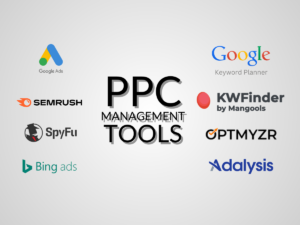Table of Contents
If you’ve been using Google Ads, you probably know that the success of your PPC campaigns depends entirely on the keywords you choose.
Yet, understanding what PPC keyword research is and how to conduct it effectively can be overwhelming, especially if you’re new to the game.
That’s why we’ve put together this comprehensive guide to help you uncover the secrets to successful ads through effective PPC keyword research.
What Is PPC Keyword Research?
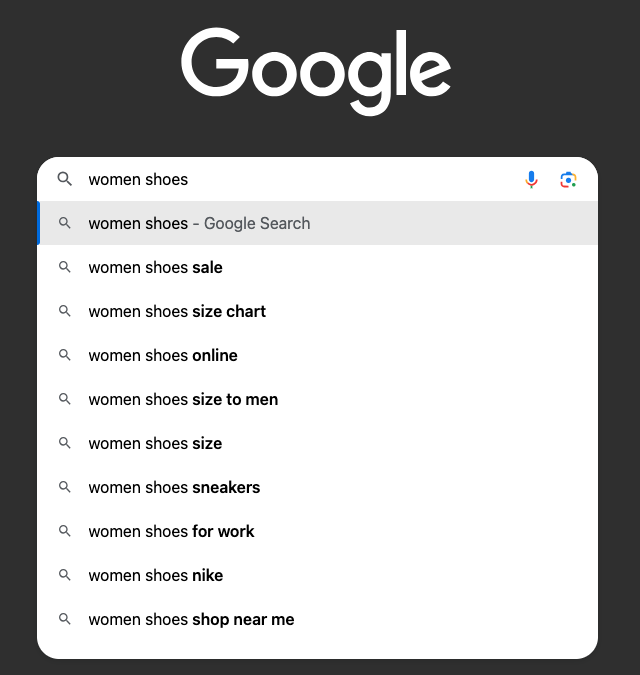
PPC keyword research is the process of identifying and selecting the keywords and phrases that potential customers may use when searching for products or services that you offer.
These keywords form the basis of your ads and are the words or phrases that trigger your ads to appear when potential customers search for them on search engines like Google.
For example, when a person searches for “best running shoes”, the ads of companies that have chosen this keyword will appear on the search engine results page.
This is why choosing the right keywords is crucial to the success of your PPC campaigns.
The Importance of PPC Keyword Research
The success of your PPC campaigns depends heavily on thorough keyword research.
Here’s why:
- Targeted Reach: By selecting relevant and specific keywords, you can ensure that your ads are shown to potential customers who are more likely to be interested in your products or services. This targeted reach leads to higher click-through rates and conversions.
- Cost Efficiency: With effective keyword research, you can avoid targeting generic and expensive keywords that may not bring in qualified leads. This helps you save money by only bidding on keywords that are more likely to result in conversions.
- Ad Relevance: Choosing the right keywords also ensures that your ads are relevant to what potential customers are searching for. This leads to a better user experience and increases the chances of them clicking on your ad.
The more targeted your keyword selection is, the more likely it is that your ads will be seen by people who are interested in what you have to offer. At the same time, if you choose the wrong keywords, you risk showing your ads to people who have no interest in your products or services, wasting your budget, and lowering your ROI.
How to Conduct Effective PPC Keyword Research
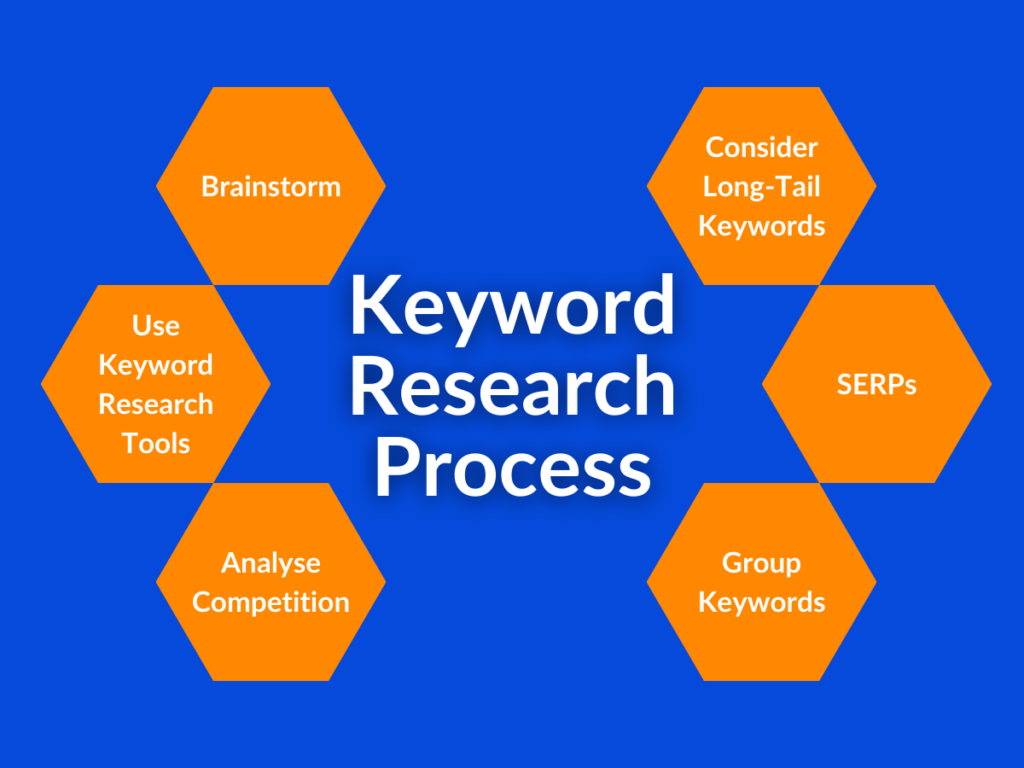
Now that you understand the importance of PPC keyword research, let’s take a look at how to conduct it effectively. Follow these steps to find the best keywords for your campaigns:
- Brainstorm: Start by brainstorming a list of potential keywords that are relevant to your business, products, and services. Think about what words or phrases your target audience may use when searching for you.
- Use Keyword Research Tools: There are various keyword research tools available such as Google Keyword Planner, SEMrush, and Ahrefs that can help you expand your keyword list and provide valuable insights.
- Analyze Competition: Look at the keywords your competitors are using in their campaigns. This can give you an idea of the keywords that may be effective for your business as well.
- Consider Long-Tail Keywords: Longer, more specific phrases known as long-tail keywords can be highly effective in reaching potential customers who are further along in the buying process. These keywords also tend to have lower competition and cost less.
- SERPs: Analyzing the search engine results pages (SERPs) for your keywords can give you insights into what users are looking for when they use these terms. By understanding the type of content that currently ranks for your keywords (e.g., informational articles, product pages, tutorials), you can tailor your approach to match the users’ needs and expectations.
- Group Keywords: Once you have a list of potential keywords, group them into relevant ad groups that can help you create targeted ads for specific products or services.
The Art of Choosing the Right Keywords
Choosing the right keywords is the crux of a successful PPC campaign. You need to strike a balance between high-volume, competitive keywords that have the potential to drive more traffic to your website and niche, targeted keywords that are more likely to convert into sales.
Here’s a deeper look:
Balancing Keyword Volume and Competition
High-volume keywords often come with intense competition, which can drive up the cost. For instance, a keyword like “running shoes” may have a high search volume, but bidding on it could be costly due to competition from big brands.
In contrast, a more specific keyword like “women’s trail running shoes blue” might have a lower search volume but less competition, making it more cost-effective.
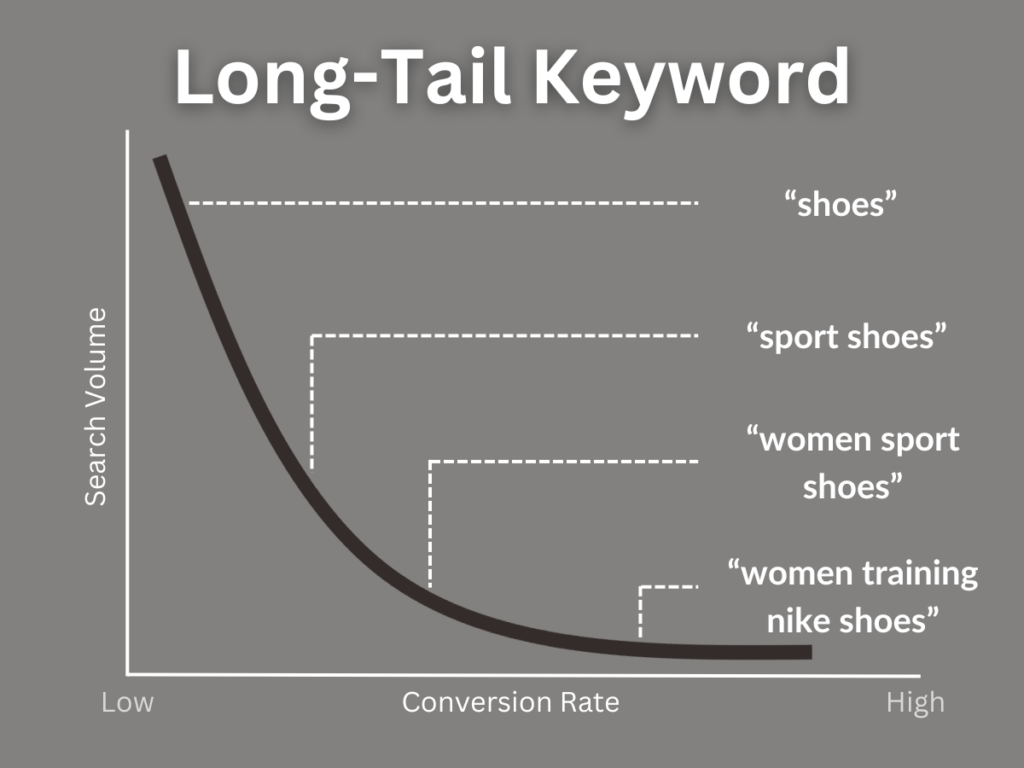
Effectiveness of Short-Tail vs. Long-Tail Keywords
Short-tail keywords, such as “shoes,” are broader and often have higher search volumes, but they might not always lead to conversions due to their generic nature.
Long-tail keywords, which are more specific, tend to have a higher conversion rate.
For example, a study revealed that an ecommerce store specialising in eco-friendly products saw a 70% increase in conversions by shifting their focus from short-tail to long-tail keywords. The long-tail keywords had less competition and were more aligned with the specific interests of their target audience.
Another case study involves a tech gadget retailer who found that while short-tail keywords drove more traffic, long-tail keywords resulted in a 40% higher conversion rate, indicating the quality of traffic these keywords can attract.
Understanding and applying these principles can significantly enhance the effectiveness of your PPC campaigns.
Overview of Popular PPC Keyword Research Tools

Keyword research tools make it easier to streamline the research process and provide insights into potential keywords that are most relevant to your business. They provide data on search volume, competition, and other factors to help you make informed decisions on the best keywords to use.
Some popular keyword research tools include
- Google Keyword Planner- great for beginners and provides data directly from Google.
- SEMrush – offers a wide range of features including competitor analysis and keyword suggestions.
- Ahrefs – provides comprehensive data on each keyword, such as search volume, keyword difficulty, and CPC.
- Long Tail Pro – specialises in uncovering long-tail keyword opportunities, ideal for targeting specific niches. It offers in-depth analysis of keyword competitiveness and profitability.
While these tools can be highly beneficial, it’s important to note that they should not be the only source of your keyword research. It’s always best to combine the insights gained from these tools with your own analysis and understanding of your target audience.
Incorporating Keywords into Your PPC Campaigns
Once you have identified the right keywords to use in your PPC campaign, placing them strategically in your ad copy is crucial.
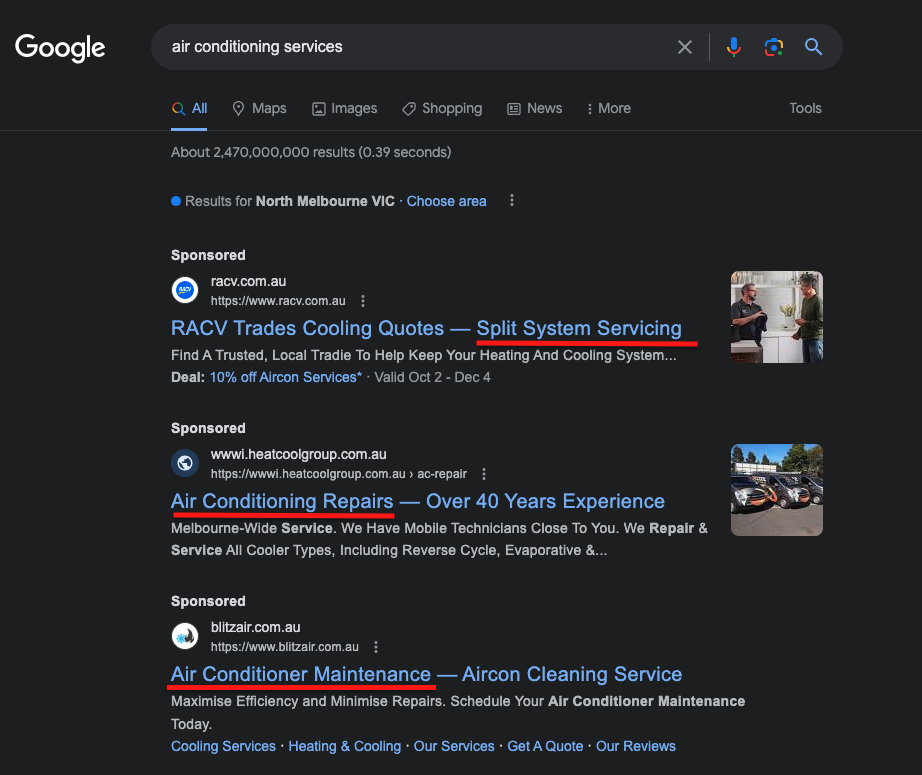
Integration of Keywords in Ad Elements
- Headline: The headline should include your primary keyword. For instance, if you’re selling ‘organic coffee beans’, your headline could be “Buy Fresh Organic Coffee Beans Online.”
- Description: Use this space to incorporate secondary keywords naturally. Continuing with the coffee example, your description might include ‘arabica organic coffee’ or ‘sustainable coffee beans’.
- Display URL: Include a keyword in your display URL, like www.yoursite.com/organic-coffee. This reinforces relevance to the user’s search query.
The ad copy should be compelling, clear, and concise, and the chosen keywords should be relevant to the target audience.
*Don’t forget To Align Keywords with Landing Page Content
Ensure the keywords used in your PPC ads are prominently featured on your landing page. If your ad focuses on ‘organic coffee beans’, your landing page should be specifically about this product, not just coffee in general.
This alignment aids in maintaining consistency in the user journey, improving the chances of conversion.
Monitoring and Adapting
The Continuous Process PPC keyword research isn’t a one-and-done process; it is a continuous process that requires ongoing analysis and adaptation to ensure that your campaign stays on track.
Example of Successful Campaign Adjustments through Ongoing Analysis
A clothing retailer noticed that ads with the keyword ‘summer dresses’ had high clicks but low conversions. Upon reviewing the landing page, they realised it featured a wide range of clothing, not just summer dresses. They adjusted the landing page to match the ad, leading to a 30% increase in conversions.
Step-by-Step Guide on Interpreting Analytics for Keyword Performance
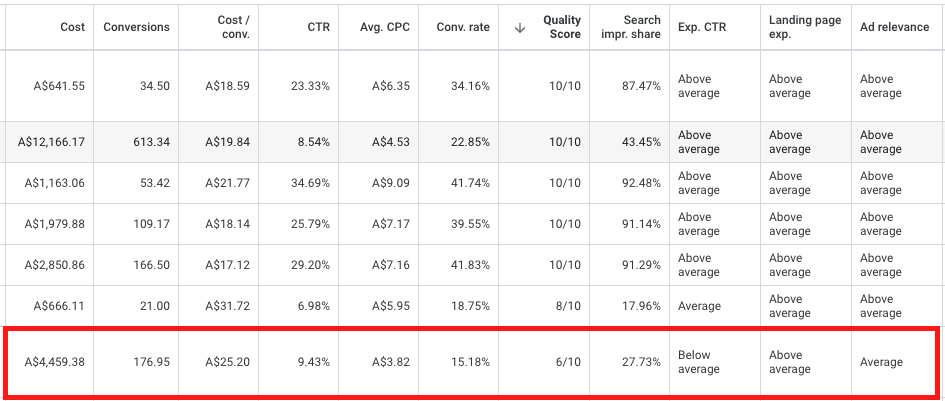
- Review click-through rates (CTR) to gauge initial interest in your ads.
- Examine the conversion rate to understand if the interest is translating into actions.
- Look at the Quality Score in Google Ads to assess relevance and landing page experience.
- Regularly check the cost per conversion to ensure you’re getting a good return on investment.
- Use these insights to refine your keyword strategy, such as pausing low-performing keywords or increasing bids on high-performing ones.
Real-World Examples: Keyword Research Success Stories
To put the above steps into perspective, here are two examples of small Aussie businesses that implemented effective keyword research strategies and saw results.
Case Study 1: Local Boutique’s Targeted Campaign
A small boutique specialising in handmade crafts used long-tail keywords like “handmade ceramic pottery in Melbourne” to target a niche market. This approach led to a 50% increase in website traffic and a 25% increase in sales over three months.
Case Study 2: Tech Startup’s Strategic Shift
A tech startup initially used broad, high-volume keywords like “project management software.” However, after shifting to more specific keywords such as “cloud-based project management for small teams,” they experienced a 35% increase in qualified leads and a 20% increase in conversion rate within two months.
These case studies highlight the tangible benefits of effective PPC keyword research in driving targeted traffic, enhancing conversion rates, and ultimately contributing to business growth.
Conclusion
PPC keyword research is a crucial aspect of any successful PPC campaign. By understanding the importance of effective keyword selection and implementing the right strategies, you can increase your chances of reaching potential customers and driving conversions.
Keep in mind that it takes continuous effort to stay on top of trends and constantly optimise your keywords for the best results. So keep researching, testing, and adapting to see continued success in your PPC campaigns.
If you’re looking for some help getting started, find out more about our expert and results-focussed PPC management services.


